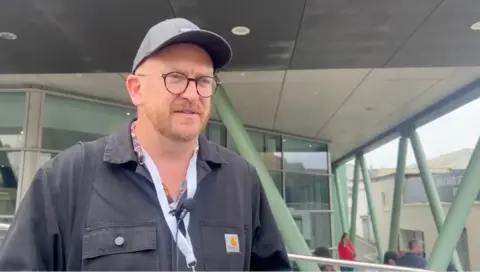- Health
Markram and Bavuma put South Africa on verge of WTC win against Australia
时间:2010-12-5 17:23:32 作者:Housing 来源:Football 查看: 评论:0内容摘要:"What we had set out to do, no-one thought we could do," he continues. "And we had become so successful in our agenda, it was hard to say, 'No, I'm going to stop now'... It was a hard decision.""What we had set out to do, no-one thought we could do," he continues. "And we had become so successful in our agenda, it was hard to say, 'No, I'm going to stop now'... It was a hard decision."
Absent from Trump's speech was any mention of possible collective action by the US and other countries; no talk of multilateral cooperation against the threat of climate change, no concerns about challenges to democratic or human rights in the region. This was a discourse almost entirely without reference to ideology or values except to dismiss their significance.Rather, he used his speech to Saudi leaders to make his clearest argument yet against Western interventionism of the past, attacking what he called "the so-called nation-builders and neo-cons" for "giving you lectures on how to live or how to govern your own affairs".
To the applause of his Arab audience, he said these "Western interventionists" had "wrecked more nations than they built", adding: "Far too many American presidents have been afflicted with the notion that it's our job to look into the souls of foreign leaders and use US policy to dispense justice for their sins."I believe it's God's job to sit in judgement. My job is to defend America."That reluctance to intervene was on show in recent days when it came to the fighting between India and Pakistan. In the past, the US has often played a key role seeking to end military confrontations in the subcontinent. But the Trump White House was initially cautious about getting involved.

Vice-President JD Vance told Fox News the fighting was "fundamentally none of our business… We can't control these countries".In the end, both he and Secretary of State Marco Rubio did make calls, putting pressure on both nuclear powers to de-escalate. So too did other countries.

When the ceasefire was agreed, Trump claimed US diplomacy had brokered the deal. But that was flatly dismissed by Indian diplomats who insisted it was a bilateral truce.
The centrality of Trump to US foreign policy has also become apparent this week. This is more than just a simple truism. On show was the lack of involvement of other parts of the US government that traditionally help shape US decision-making overseas.For a week last November, the photo above - apparently taken at a stand-up show in New York - was his Wikipedia picture.
When it was removed, an editor noted "having no picture is better than what's currently there".The photo of the English footballer Kyle Bartley, taken in 2011, has also been highlighted by social media users as evidence of Wikipedia's picture problem.
started its work at the beginning of 2024.The photographers are not paid and most are based in the US, but there are volunteers across the world.
- 最近更新
- 2025-07-07 09:01:49Trump is on edge about the Israel-Iran ceasefire, but markets are celebrating
- 2025-07-07 09:01:49Halloween money magic: 7 smart ways to scare up savings and boo-st your finances
- 2025-07-07 09:01:49Five years since the murder of George Floyd, what has changed?
- 2025-07-07 09:01:49Chaos erupts as Palestinians rush to aid site after months of blockade
- 2025-07-07 09:01:49Harvard students protest Trump’s university crackdown
- 2025-07-07 09:01:49India top general admits aerial ‘losses’ in recent conflict with Pakistan
- 2025-07-07 09:01:49Closing on a house: What to expect
- 2025-07-07 09:01:49Bobby Sherman, heartthrob singer and TV actor of the 1970s, dies at 81
- 热门排行
- 2025-07-07 09:01:49Ree Drummond’s Perfectly Baked Beans
- 2025-07-07 09:01:49‘Foreigners for both nations’: India pushing Muslims ‘back’ to Bangladesh
- 2025-07-07 09:01:49State of the Automotive Finance Market: Q4 2024 [PDF]
- 2025-07-07 09:01:49How the Fed rate affects your savings: What to expect for every type of bank account
- 2025-07-07 09:01:49Kardea Brown’s Sweet Heat Baked Beans
- 2025-07-07 09:01:49Trump’s tariffs ruled illegal: Will this end US trade war?
- 2025-07-07 09:01:49How the Fed rate affects your savings accounts
- 2025-07-07 09:01:49US government investigates attempt to impersonate Trump’s chief of staff
- 友情链接
- Niger to nationalise uranium mine operated by French state-affiliated firm The Netherlands returns 119 stolen sculptures to Nigeria ‘I realised I was alive’: Sole survivor of Air India crash recounts tragedy Boeing CEO cancels airshow visit as investigation starts on India crash Why India refused to join SCO condemnation of Israel’s attacks on Iran Al Jazeera Centre for Public Liberties & Human Rights “Will Israel accept” Iran if it’s not a nuclear threat? African manhood is broken – and it’s costing women their lives Lone survivor of Air India crash mourns brother Is Trump planning an ‘Africa visa ban’? US strikes Iran, what comes next? India says it will ‘never’ restore Indus Waters Treaty with Pakistan African manhood is broken – and it’s costing women their lives Is Trump planning an ‘Africa visa ban’? Amid US-Pakistan thaw, two key challenges: Iran and China Sorry, Mr Gates, your billions won’t save Africa Seven killed in helicopter crash in India’s Uttarakhand state ‘Thithi president!’: Supporters rally for banned Ivorian opposition hopeful ‘I realised I was alive’: Sole survivor of Air India crash recounts tragedy Thunder beat Pacers in Game 7 to bring first NBA crown to Oklahoma City Al Jazeera Centre for Public Liberties & Human Rights Markram and Bavuma put South Africa on verge of WTC win against Australia Markram and Bavuma put South Africa on verge of WTC win against Australia Iran warns US of consequences after strikes, says Trump betrayed his voters Iran-Israel conflict raises alarm in Pakistan amid fears over own security DR Congo and Rwanda to sign peace agreement on June 27 Are commercial interests driving Uganda’s military operations in DR Congo? Markram and Bavuma put South Africa on verge of WTC win against Australia Which teams are in the Club World Cup knockouts, and who can still make it? Is Trump planning an ‘Africa visa ban’?

